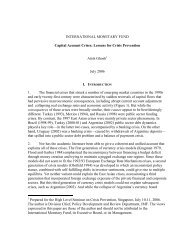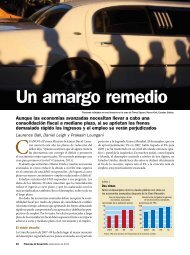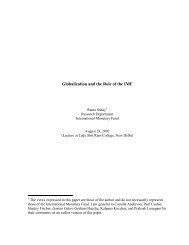Chapter 20: Taxation of Corporate Reorganizations - IMF
Chapter 20: Taxation of Corporate Reorganizations - IMF
Chapter 20: Taxation of Corporate Reorganizations - IMF
You also want an ePaper? Increase the reach of your titles
YUMPU automatically turns print PDFs into web optimized ePapers that Google loves.
Tax Law Design and Drafting (volume 2; International Monetary Fund: 1998; Victor Thuronyi, ed.)<br />
<strong>Chapter</strong> <strong>20</strong>, <strong>Taxation</strong> <strong>of</strong> <strong>Corporate</strong> <strong>Reorganizations</strong><br />
treatment <strong>of</strong> reorganizations if there are special nonrecognition 4 rules and the considerations in<br />
designing those tax rules. The discussion supports the desirability <strong>of</strong> having at least some basic<br />
reorganization provisions if policymakers consider that the tax system should not discourage<br />
corporate restructuring.<br />
In transition countries, reorganizations can occur as part <strong>of</strong> the privatization process or<br />
thereafter as the ownership <strong>of</strong> companies changes hands. Even when the top priority is to make<br />
existing businesses work rather than to reorganize them through merger or division, it is<br />
necessary to think from the start about rules in civil or commercial law that would allow<br />
mergers, acquisitions, or divisions, and about their tax implications. It is better not to wait until<br />
the first practical cases arise. In developing countries, reorganizations may or may not take place<br />
very <strong>of</strong>ten. Even if they are not frequent, however, it makes sense to have a set <strong>of</strong> rules in place<br />
so that business reorganizations are not impeded by the tax system. In addition, foreign investors<br />
will be more confident when they notice that the legal system in general, and the tax system in<br />
particular, provides for such transactions, to which they are used in their own business<br />
environment.<br />
Industrial countries generally have specific rules for tax-free reorganizations. In the<br />
absence <strong>of</strong> such rules, business reorganizations could lead to taxable transfers <strong>of</strong> assets or shares.<br />
The resulting tax liabilities could be so large as to obstruct business reorganizations. The general<br />
policy view in most countries is that it is economically not efficient to tax corporate<br />
reorganizations, because taxation would discourage reorganizations. Where there is a<br />
continuation <strong>of</strong> business activities and <strong>of</strong> the interest <strong>of</strong> the shareholders in the company, a<br />
corporate reorganization may be considered as tantamount to a legal restructuring <strong>of</strong> the same<br />
business, which does not constitute a sufficient change in economic position to merit taxation.<br />
In developing and transition countries, the basic issues in designing the rules for<br />
corporate reorganizations are the same, although these countries will generally want to adopt<br />
rules that are as simple as possible given that the volume <strong>of</strong> reorganizations will be relatively<br />
small. In addition, special issues will be involved in the treatment <strong>of</strong> investment funds and in<br />
privatization, to which we refer in this chapter from time to time. 5<br />
II.<br />
Forms <strong>of</strong> <strong>Corporate</strong> Reorganization<br />
Reorganization is used here in a general way to describe transactions involving<br />
significant changes in the legal or economic structure <strong>of</strong> one or more business enterprises. In<br />
some countries neither company law nor tax law defines the term, although specific forms <strong>of</strong><br />
reorganization may be defined, 6 while other countries have a general tax law concept <strong>of</strong><br />
reorganization. 7<br />
4 This term is explained supra ch. 16, sec. V(B)(7).<br />
5 See Yolanda Kodrzycki & Eric Zolt, Tax Issues Arising from Privatization in the Formerly Socialist Countries, 25<br />
Law & Policy in Int’l Business 609 (1994). See ch. 21 for taxation <strong>of</strong> investment funds.<br />
6 Canada has a definition <strong>of</strong> an amalgamation in sec. 87 (1) ITA, but no overall definition. Council Directive <strong>of</strong> July<br />
23, 1990 (90/434/EEC) refers separately to “mergers, divisions, transfers <strong>of</strong> assets, and exchanges <strong>of</strong> shares.”<br />
- 2 -
















